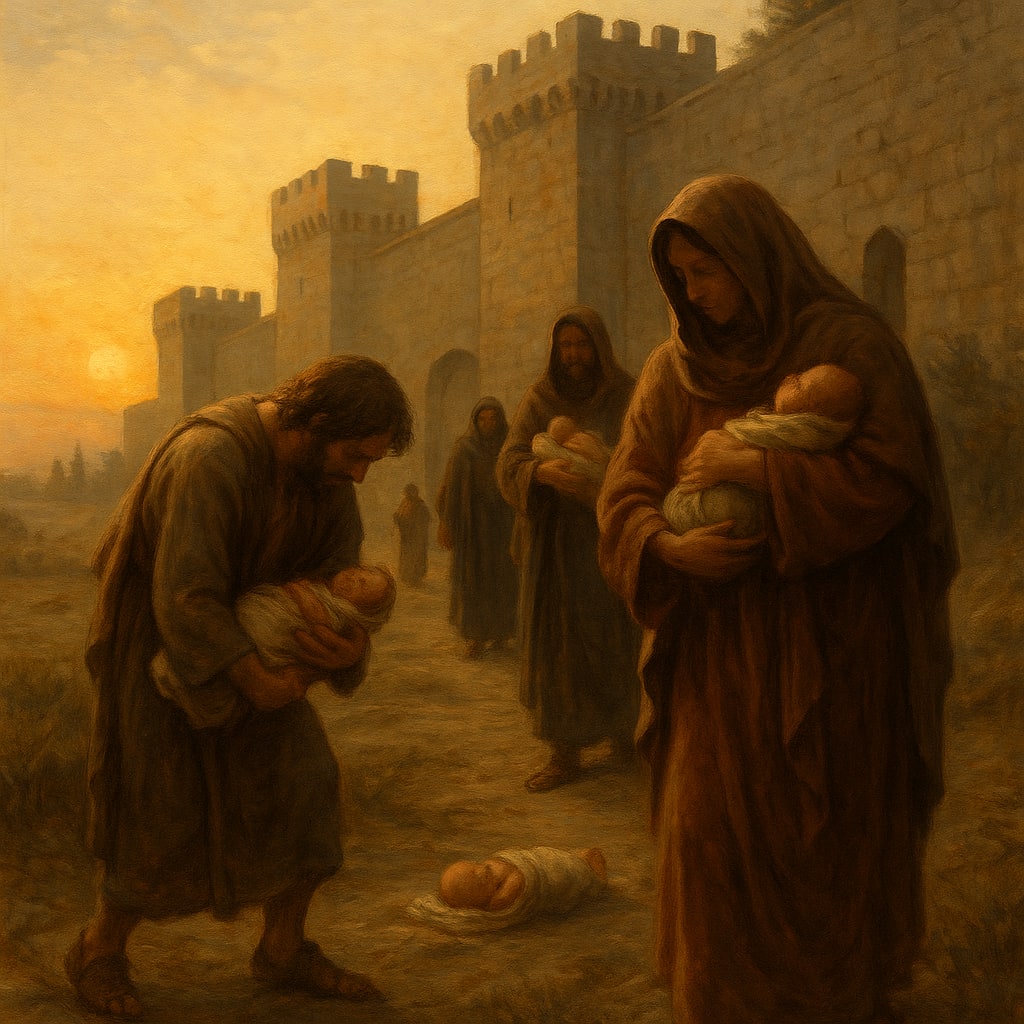In the Roman Empire, unwanted newborns were regularly exposed to die. Left near trash heaps or at the edge of cities, these infants, especially girls or those born with deformities, were not hidden but openly discarded. Exposure was not a crime. It was a socially accepted and legally protected practice.
Against this brutal norm, early Christians responded in ways that shocked their neighbors. They rescued abandoned children and condemned abortion. These actions were grounded in conviction, not in public recognition or theological consensus. Their efforts began decades before the Church developed formal doctrines about the soul or personhood.
The Didache, likely written between 70 and 120 AD, offered one of the earliest Christian ethical codes. It stated: “You shall not murder a child by abortion nor kill what is begotten” (Didache 2.2). Around the same period or slightly later, the Epistle of Barnabas reinforced this view: “Thou shalt not slay the child by procuring abortion, nor again shalt thou destroy it after it is born” (Barnabas 19.5). These were not abstract philosophical musings. They were urgent moral instructions addressed to everyday believers.
Modern critics sometimes claim that pro-life positions are simply outgrowths of later Catholic teaching, particularly the doctrine that the immortal soul enters the body at conception. But that framework came much later. The moral rejection of abortion was already deeply embedded in Christian identity long before the Church developed any formal position on ensoulment. The early Church Fathers opposed abortion without requiring metaphysical definitions.
Quintus Florens Tertullian, c. 160 – c. 225 AD, Apology, 9, 8. (c. 160–c. 225 AD) stated plainly: “For us murder is once for all forbidden; so even the child in the womb, while yet the mother’s blood is still being drawn on to form the human being, it is not lawful for us to destroy. To forbid birth is only a quicker murder. It makes no difference whether one takes away the life once born or destroy it as it comes to birth. He is a man, who is to be a man; the fruit is always present in the seed.”
This was an ethical statement rooted in the belief that life is valuable before birth. He did not anchor this position in a precise account of when the soul enters the body.
Athenagoras of Athens, writing around 176 AD, told Roman officials: “We say that those women who use drugs to bring on abortion commit murder and will have to give an account to God.” Again, there is no reference to soul theory. There is simply a moral conclusion: abortion is wrong.
Augustine of Hippo (354–430 AD) did wrestle with the timing of ensoulment and followed Aristotle in suggesting that the rational soul arrives at a later stage of development. Even so, he called abortion “either homicide or something akin to it” in On Marriage and Concupiscence 1.17. The wrongdoing did not depend on metaphysical certainty about the soul’s entrance. The act itself was condemned.
Origen (c. 184–c. 253 AD) discussed the soul at length but did not suggest that abortion could ever be morally justified, regardless of those complexities. Gregory of Nyssa (c. 335–c. 395 AD) wrote that the soul and body are formed together, making any distinction between pre- and post-ensoulment ethically meaningless. Even Thomas Aquinas (1225–1274), who distinguished stages of fetal development, held that abortion at any stage was gravely sinful and contrary to natural law (Summa Theologiae II-II, q.64, a.8).
It was not until the Council of Vienne in 1312 that the Church formally declared that the soul is the form of the human body. But that was more than a thousand years after Christians had already been saving infants, condemning abortion, and forming moral communities around the protection of life. The historical record does not support the view that pro-life beliefs originated in metaphysical doctrines. It shows that they began as acts of compassion and communal conscience in a world where the weak were routinely discarded.
This moral stance formed in dialogue with Jewish legal and ethical traditions. Jewish law in the Second Temple period and early rabbinic writings was more protective of unborn life than Greco-Roman custom, although it permitted abortion in cases where the mother’s life was at risk. The Mishnah, codified around 200 AD, taught that if a mother’s life was endangered during labor, the fetus could be removed. Once the baby’s head had emerged, it was treated as a separate life that could not be sacrificed, even to save the mother.
Philo of Alexandria, writing in the first century, condemned abortion as a violation of nature in Special Laws 3.110–119. Josephus, in Against Apion 2.202, stated that Jewish law required raising all offspring and forbade abortion. These views reflect a high regard for life, although Jewish tradition did not assign full personhood to the fetus under all circumstances.
Early Christians absorbed and extended these values. They moved beyond legal status distinctions and prohibited both abortion and infanticide outright. In the process, they rejected the Greco-Roman view that life before birth or life born into hardship was expendable. Their teachings were shaped not by speculative philosophy but by direct confrontation with a brutal culture and a deep conviction that every person, no matter how small or silent, matters.
This historical clarity stands in contrast to modern legal frameworks that draw a sharp line between life inside and outside the womb. Today, in many jurisdictions, abortion is permitted up to the point of birth, while killing a child after delivery is prosecuted as homicide. The boundary is defined not by moral reasoning or biological difference but by physical location.
The modern claim that pro-life beliefs depend solely on Catholic doctrines about the soul fails historically.
That distinction mirrors ancient legal divisions in Roman and Jewish law. But early Christians rejected it. In their view, the moral worth of the child was the same before and after delivery. The acts of abortion and infanticide were treated as morally equivalent.
This is why the modern claim that pro-life beliefs depend solely on Catholic doctrines about the soul fails historically. The earliest Christians were pro-life before there were developed Catholic doctrines, before the concept of ensoulment was refined, and while the Church was still underground. Their reasons were practical, moral, and communal.
The early Church’s actions matched its teachings. They adopted exposed children, gave them names, and raised them as their own. They took up collections for widows and orphans. They visited the sick and the imprisoned. These were not abstract beliefs. They were daily decisions that set the Christian community apart.
. Subscribers gain access to case law summaries, historical analysis, and real-time updates on issues at the intersection of belief and public life.
This article is for informational purposes only. It does not constitute legal advice. For questions about specific legal situations, consult a licensed attorney.
. Subscribers gain access to case law summaries, historical analysis, and real-time updates on issues at the intersection of belief and public life.
This article is for informational purposes only. It does not constitute legal advice. For questions about specific legal situations, consult a licensed attorney.
Source: ReligiousLibertyTV on Substack

